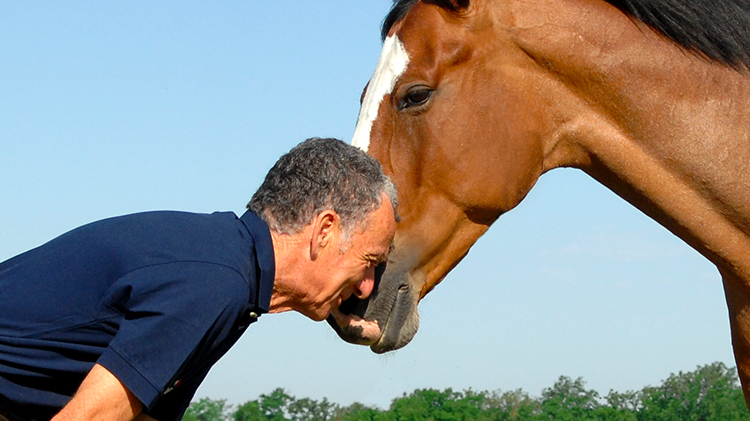You are here
Your horse is talking about you!

It is amazing to observe to what extent horse and rider influence each other both mentally and physically. This is especially true of horses and riders who have been working together for a long time.

From one rider to another...
When riding someone else’s horse I am very quickly affected by this influence, to the extent that if one does not pay attention it is easy to fall into the bad habits of the its usual rider
I recently rode a horse with regular paces, balanced and above all perfectly calm on the flat. After warming up, I decided to jump a few very small fences to start with. A few strides off a small fence I suddenly felt an abnormal anxiety in the horse. His breathing was blocked and his movements lost all their suppleness. The horse jumped but his jump was as if paralysed by fear. A few metres after landing, everything returned to normal and the horse started to breathe normally again.
It wasn’t hard to understand that the horse was reproducing his usual rider’s fear-ridden behaviour. The danger would have been allowing me to be drawn into the horse’s game. I think that very quickly my own breathing would have been blocked in front of each fence.
This example is a good illustration of the importance of always taking time to assess the situation, with regard to the horse’s physical and mental state, its experience, my position, my state of mind at that moment...in the long term this means saving a great deal of time. Short term it is a good technique for not falling into the trap of the horse’s bad habits.
There are also many other examples, such as the rider whose hands are too high, or who sits in the saddle in a specific manner. To compensate the inconvenience caused by this bad distribution of its rider’s weight, the horse will tend to organise his attitude so as to suffer as little as possible. If you were to ride this horse, you would quickly tend to assume the same defect as the rider, because the horse would put you in this position with his behaviour and his attitude.
Likewise, if you are sometimes tense and worried, the horse will perceive your tenseness and he too will be blocked. Usually this happens to the same part of the body as in your own: i.e. tense jaws or a rigid back.
Humans are beings of habit
I also often notice that the same riders often ride the same kind of horses. A rider who for a long period of time rides a horse with a particular technique and style, will tend to reproduce and look for the same configuration in all the horses he rides. Human beings are creatures of habit and tend to constantly re-create the same situations. I remember a rider who had won many competitions with a horse that was very hot, held his head up in the air and was ewe-necked. Nowadays, all the horses she rides look like that. I am convinced that her lack of analysis has resulted in her missing many experiences, which no doubt would have allowed her to progress in her riding. It is also very damaging to her horses that inevitably suffer due to this mistaken and unnatural position. In the short term, they all end up with the same pathologies.
Back to your true self...
To confront these situations, in which the rider tends to render his riding dependent on the horse’s habits or defects, it becomes crucial to constantly concentrate on one’s own sensations and to keep one’s centred position. One must do this until the horse understands that it is more comfortable to function in a normal position.
I often use the horse’s conformation as a starting point; with the objective of later ensuring that it has a frame of mind favourable for working correctly. I start for example by warming the horse up on the lunge. Without a rider on its back, the horse is able to move freely and assumes a better attitude, being physically more ready to do well when one rides it.
I can also start working with an analysis of my own mental or physical state. It is important to be free of pressure caused by fear, resentment or absolute will… In short, being oneself, and having an even spreading of one’s energy between actions, thoughts and feelings. If one is dominated by one’s emotions, by fear or anger, analytic capabilities are altered and actions lose their effectiveness. Communication with the horse can no longer be established in a manner that is clear and understandable for it.
Once the “head” is in order, it is possible to concentrate - with a free mind - and then physically work on being as close as possible to the ideal seat. It is only under these conditions that horse and rider can really be in harmony.
Extract of the book "Secrets and method of a great champion"










